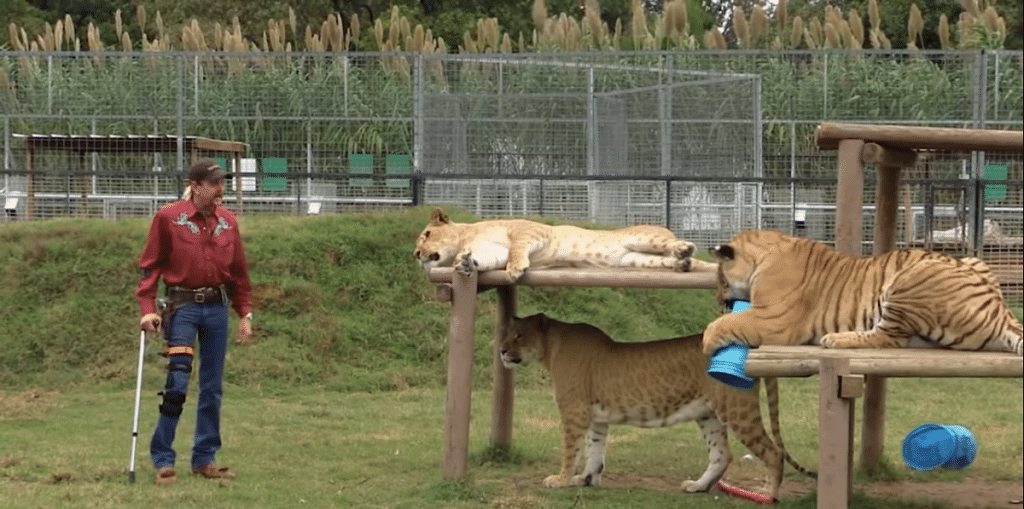There is absolutely nothing to like about Netflix’s Tiger King. And yet, since its release on 20 March, it has been the streaming platform’s most-watched show, garnering 34.3 million unique views in its first 10 days. Every second Instagram meme has a Tiger King reference, every guy who makes a “Feminazi” joke mentions Carole Baskin, who, rumour (arguably fuelled by the show, based on no evidence) has it, fed her husband to the tigers at her sanctuary. Yes, that’s how twisted it is.
It is understandable why Americans are glued to it. But why are Indians obsessed with Tiger King? It’s entertaining, sure, but only up to a point. And it’s so hugely unrelatable to us that its success in this country is somewhat baffling. Is it hate-watching? Is it like cringe porn? Or is it plain old Indian pride? It’s complicated.
The seven-episode true crime show about the bizarre links between big cat collectors in the US, including Joe Exotic (who some may remember from his failed campaigns to run for US president and later, Governor of Oklahoma) and those like Carole Baskin, who call themselves conservationists, is grotesque, terrifying, hyper-sensationalist and cringe-inducing – and yet, no one can stop watching it or talking about it.
Also read: Masakali remix leaves Rahman unimpressed, social media goes berserk with memes, jokes
Misplaced pride or a common enemy
While the show focuses largely on Joe Exotic and his rivalry with Carole Baskin, there are other characters who are a big part of it, notably Bhagavan ‘Doc’ Antle, who is less flashy than Joe Exotic, but equally disturbing. He is someone who forces female employees at his wildlife preserve to dress in cat-print bodysuits, makes them get breast implants and much else.
He is a follower of godman Satchidananda, he believes in something called animal yoga. And then there’s Joe Exotic, who keeps talking, ironically and deludedly enough, about karma.
I have a hunch that this is probably a major draw for Indians: either to hate on the show for its cultural misappropriation (Antle doesn’t even know what Bhagavan means) or to take (hollow) pride in the fact that, like with Wild Wild West, Indian spirituality is coming of age on Netflix. Except it’s not really coming of age, it’s regressing. But then, this is, with due respect to Cat Stevens, a strange, bewildering time and India needs something to cling to.
Also read: Here’s what Indians are watching during Covid-19 lockdown. Spoiler: It’s not Friends reruns
We need something to feel good about ourselves
In the last eight months, the idea of India has taken a real beating. Between the undemocratic lockdown in Jammu & Kashmir, the CAA-NRC-NPR disaster that led to months of protest across India, the Delhi riots in February and the suffering of migrant workers after the lockdown, many Indians have felt depressed and anxious about what the country has become.
Added to that is the general anxiety about Covid-19, worrying about one’s own and one’s parents’ health, worrying about job security in an already tanking economy and trying to learn how to live in isolation.
Enter Joe Exotic, Carole Baskin, and a whole host of unsavoury characters so far removed from everything we have known or ever want to know, that we instantly feel better about our lives. At least we have some values, we think, smugly.
Because the thing is, our social and economic systems and laws just don’t allow for this kind of flashy, bizarre lifestyle. US laws and its unchecked capitalist system didn’t restrict private ownership of big cats, so even though what these people were doing was wrong by any ethics book, it wasn’t illegal.
In India, we have certain family systems, we have all kinds of wildlife laws, plus we have religious and nationalistic associations with the natural world. We worship snakes, cows and monkeys, the tiger is our national animal. We would never, we think in relief, have a situation where the number of captive tigers in our country is higher than the number of tigers in the wild in the rest of the world.
The show also highlights the nexus between big cat owners, drugs and the lack of any meaningful gun control in the US – also not a problem that we in India have right now. We have other problems, sure. But in our self-quarantine, in our loneliness and our uncertainties, we need to hold on to something for comfort. And Tiger King, as insane as it is, is so wildly unrelatable, so alien to the Indian ways of life, that perhaps that is precisely why we are comforted by it.
Views are personal.
